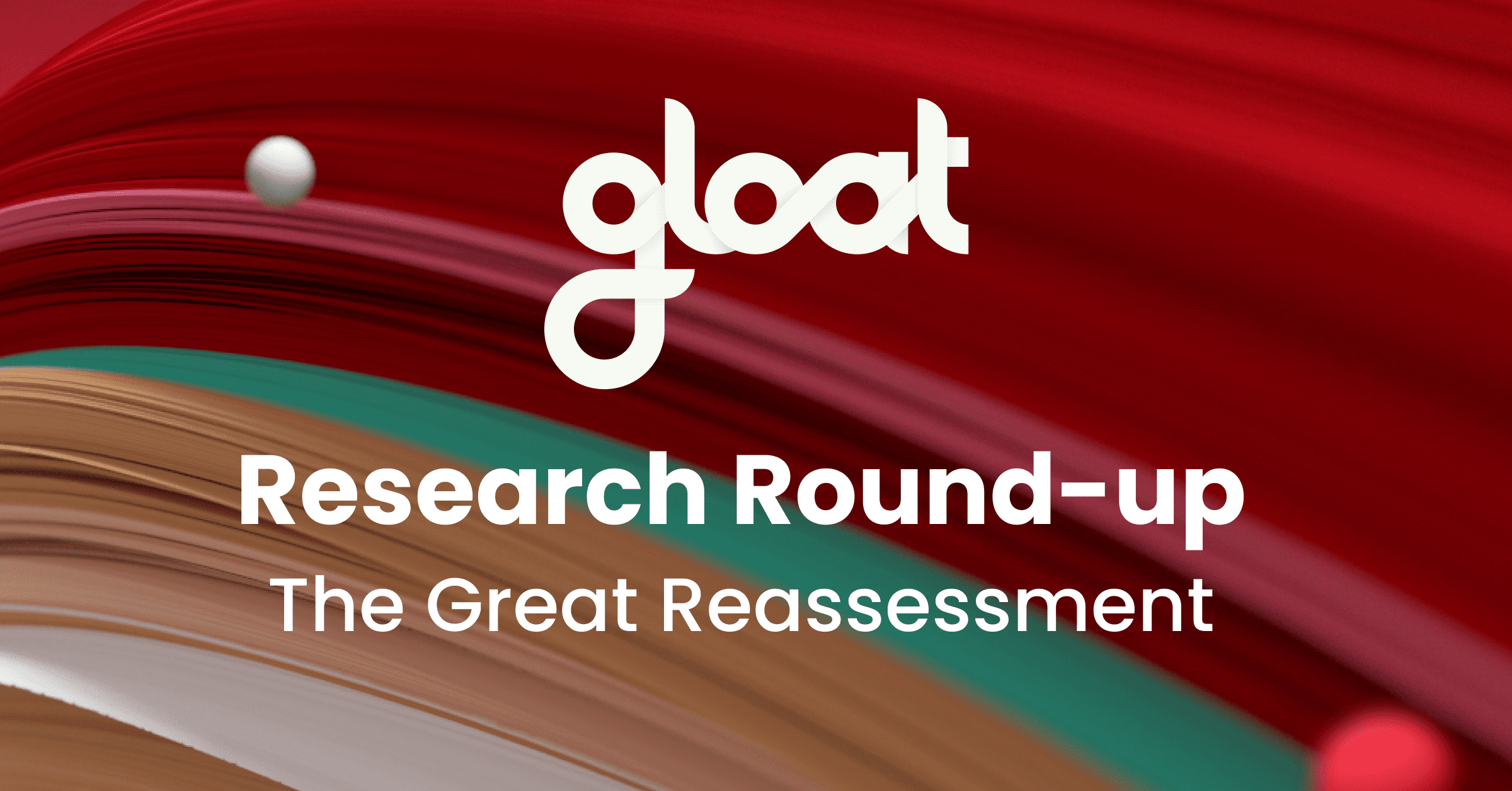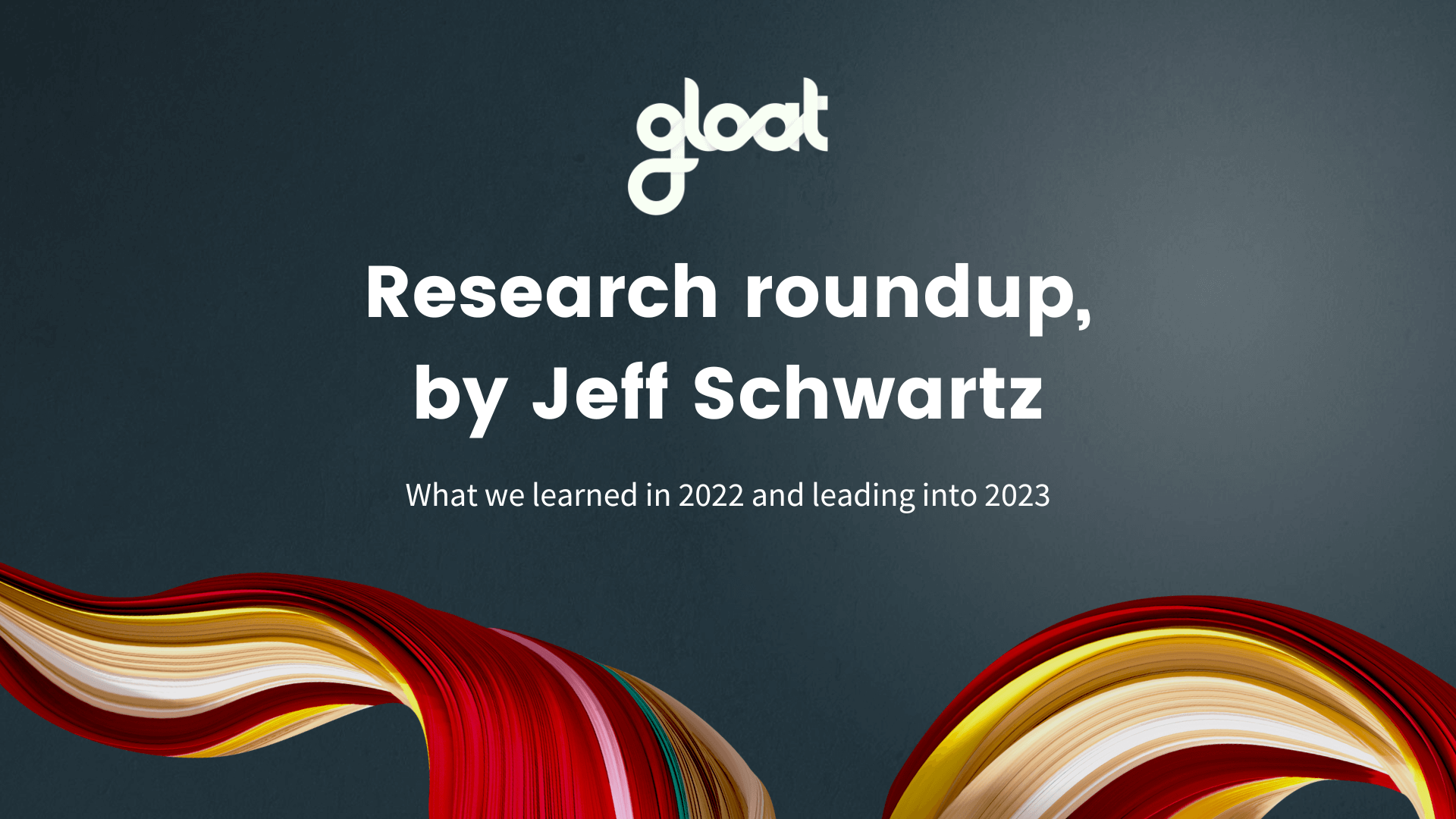August Research Round-Up

What I’m Reading, Listening to, and Thinking About in the World of Talent Marketplaces

By Jeff Schwartz, VP Insights of Impact @ Gloat
It’s been about two months since I’ve stepped into my encore career and announced my new role at Gloat. During my first weeks on the job, I kept coming back to the same question: what do I want to accomplish as our first-ever VP of Insights and Impact?
Ultimately, I want to help our clients, businesses and organizations around the world enact the kinds of transformational changes that they’ll need for the next chapter of work. With so much uncertainty in our world today, crafting a path forward isn’t easy. However, if we keep our fingers on the pulse of workplace trends and embrace experimentation, I think it’s possible.
The real challenge that we’re all facing right now is that we must make sense of a world of work that is changing dramatically, not just moving faster, and rapidly evolving beyond many of the mental models, management practices, and organizational structures we’ve relied on for decades. To truly thrive in the future of work, we need to identify the emerging forces shaping the workplaces and workforces of the 2020s and to do that, we need to absorb as much of the great writing, research, and discussions happening around the workplace as we can.
In my announcement, I joked that I didn’t retire from Deloitte, but instead graduated. 25 years as a management consulting partner has reinforced my belief that best practices are meaningful when they are grounded in data, insights, and information. In addition, we’re not only looking for best practices, we’re also looking for next practices. So when I sat down to write my book, WORK DISRUPTED, I combed through countless pieces of research and conducted dozens of interviews to understand what was working and how to frame the work and world ahead– not just looking backwards, but looking forward as well.
I’ve taken this love of research and my innate sense of curiosity with me, and it’s going to underpin what I do here at Gloat. Since a big part of my own mission is to help businesses prepare for the future of work, the last thing I’d want to do is keep these insights to myself. Instead, I’m going to share what I’m listening to, reading, and thinking about, so that we can all get our hands on the insights needed to make a real impact.
Every month (that’s the goal!) I’ll be curating a selection of pieces that shaped my thinking about the topics at the intersection of the future of work and talent marketplaces. It felt natural to begin with The Great Resignation, which I have also referred to as the Great Reassessment, since this theme has dominated many HR and business conversations this summer. It also promises to profoundly influence the way we manage talent and the systems we put in place to set our people up for success.
While there are a lot of Great Resignation titles worth exploring, here are some of the highlights that I think every business leader will, I trust, find valuable:
LISTEN: What I’ve been playing on repeat
HR Leaders Live Panel Discussion: How the World’s Top Companies are Building an AI Talent Marketplace, HR Leaders, by Christopher Rainey
Talent marketplaces have quickly become a critical new strategy and platform among the most innovative and agile organizations that are pioneering the future of work. Chris Rainey corralled leaders from four pioneering global organizations in a recent podcast episode dedicated to exploring the role that talent marketplaces have played in their business transformations. Tune in for can’t-miss insights from Markus Graf, Novartis’s VP HR & Global Head of Talent; Divkiran Kathuria, Director of Talent Marketplace Technology and Transformation at Seagate; Mauricio Pordomingo, VP of HR & Talent Leader Europe at PepsiCo; and Watson Stewart, Global Head of Talent Solutions at Standard Chartered.
READ: What’s new in thought leadership about the future of work
Workers, in Demand, Have a New Demand of Their Own: A Career Path, The New York Times, by Steve Lohr
New York Times writer Steve Lohr explores one of the most exciting changes that The Great Resignation has set into motion: dead end jobs are out, meaningful career paths are in. As low-wage employees pivot careers and look for brighter futures, leading organizations are transforming their hiring and promotion practices to meet them where they are at. This shift underscores the importance of harnessing talent that was previously untapped and equipping all employees with the learning experiences and opportunities needed to progress their careers, which is exactly where a talent marketplace can come into play.
Worried About the Great Resignation? Be a Good Company to Come From, Harvard Business School’s Working Knowledge, by Sandra J. Sucher and Shalene Gupta
Harvard Business School professor Sandra J. Sucher offers a fresh take on tackling this summer’s burgeoning labor shortage. Forget about trying to hold onto employees who want to leave, and instead focus on making your business somewhere they’ll be proud to have on their resume. Ultimately, when organizations invest in their people and set themselves apart as great places to learn, retaining and developing top talent becomes a non-issue.
Transforming the Great Resignation into the Great Hire, Willis Towers Waston, by John M. Breman
When it comes to talent management, The Great Resignation has put virtually every business in defense mode. In his latest thought leadership piece, John M. Bremen argues that the superior strategy is to become a “net talent gainer”, by focusing on why people join and stay, as well as why they leave. He offers several key practices for success, including giving employees flexibility and agency as well as creating diverse and inclusive environments where everyone feels heard and respected.
Finding Purpose During the Great Resignation, Korn Ferry, by Daniel Goleman
Author and science journalist Daniel Goleman takes a close look at one of the issues at the heart of the Great Resignation: employees’ quest for purposeful work. For many, the pandemic presented an opportunity to take a step back and think about what really matters. After months of reflection and reassessment (more on that below!) employees are ready to jump ship for more fulfilling opportunities that closely align with their values.
THINK: What research and studies are saying about our path forward
The ‘Great Resignation’ is Really the ‘Great Discontent’, Gallup, by Vipula Gandhi and Jennifer Robison
Gallup’s latest research confirms something that many of us had already suspected: employees aren’t happy with the status quo. The global analytics firm reveals that engagement took a serious hit during the pandemic and that the employees who are most eager to leave are those who consider themselves actively disengaged. The takeaway here is that engagement and retention are very much intertwined. In fact, one Gallup client found that prioritizing engagement improved turnover in critical high-turnover roles by 36 percentage points and reduced the 100-day attrition rate by nine points.
ICYMI: What I keep coming back to
It’s not a ‘labor shortage.’ It’s a great reassessment of work in America, The Wasingtion Post, by Heather Long
Back in May, Washington Post reporter Heather Long coined the phrase that arguably best sums up what we’re seeing: The Great Reassessment. Yes, employees are resigning in droves, but that’s really the manifestation of something much bigger. People are reflecting on the role they want work to play in their lives, and many are interested in doing something different. While this may have been written several months ago, it’s still very relevant today, as evidenced by a recent Labor Department report that shows we’ve just reached a record-breaking 10.1 million job openings.
Welcome to the ‘YOLO’ Economy, The New York Times, by Kevin Roose
After months of lockdowns and stay at home orders, workers are looking to live it up, the New York Times columnist Kevin Roose wrote back in April. He goes on to compare what many of us were feeling at the time to the “YOLO” (you only live once) mentality that rapper Drake first popularized a decade ago. While the article profiles a few employees who decided to get adventurous by trying something drastically different, the real challenge for businesses is to demonstrate that workers can achieve this sense of excitement and exploration within their own organizations.
The worker-employer relationship disrupted, Deloitte, by Erica Volini, Kraig Eaton, David Mallon, and Jeff Schwartz
Want some context around “The Great Resignation” headlines you’re likely seeing everywhere? Look no further than this Deloitte special report, which explores how the worker-employer relationship has changed and how it might continue to evolve in the post-COVID world. During the height of the pandemic, employers were called upon to support their workers’ health, livelihoods, and dignity to an unprecedented degree. Some buckled under the pressure, while others rose to the challenge. Both outcomes have gotten us to where we are today: reflecting on what we’re looking for from our organizations and turning an eye towards driving lasting change. The report considers four future scenarios for the worker-employer relationship including “work as fashion,” “the war between talent,” “work is work,” and “purpose unleashed”. Multiple futures are playing out that we need to be prepared to lead.
Gaining a skills edge through agile talent practices, Mercer, by Brian Fisher, Kate Bravery, Jean Martin, Jen Saunders, Kabir Nath, Mary Ann Sardone, Adrienne Cernogi, and Elana Abernathy
The Great Resignation has ignited a new war for talent that makes this Mercer whitepaper feel particularly relevant right now. As labor shortages cause talent pools to dry up, upskilling and reskilling initiatives will continue to come to the forefront. Rather than looking outside your workforce to bridge existing skills gaps, businesses have an opportunity to cultivate the capabilities they need within their own walls. Mercer points to internal talent marketplaces as a vital tool, especially when combined with a company culture that puts every employee in the driver’s seat of their own career.
CONNECT: What future-fit organizations and leaders are talking about
Unilever Series on FLEX Experiences
Curious what talent mobility looks like in action? Check out Unilever’s series of employee spotlights on Linkedin, which chronicle how various team members have transformed their careers with the help of their AI talent marketplace, FLEX Experiences. One recent example showcases Angelica Louise Amik, a Talent Advisor Lead who took on a temporary marketing role for a recent Dove Self-Esteem Project. At a time when so many employees are looking to expand their horizons and try something different, Unilever’s latest series demonstrates how enterprises can adapt to meet their workforce’s evolving expectations.
Let us know what you would add to our list!





